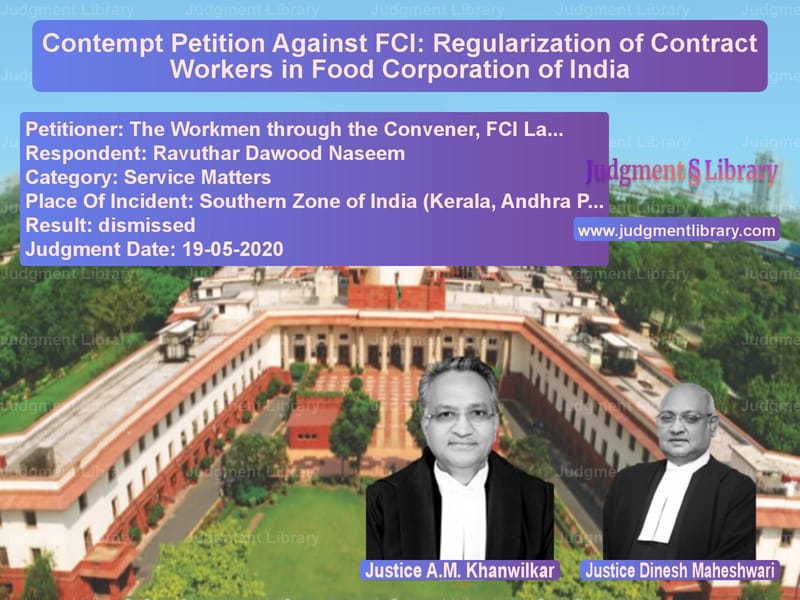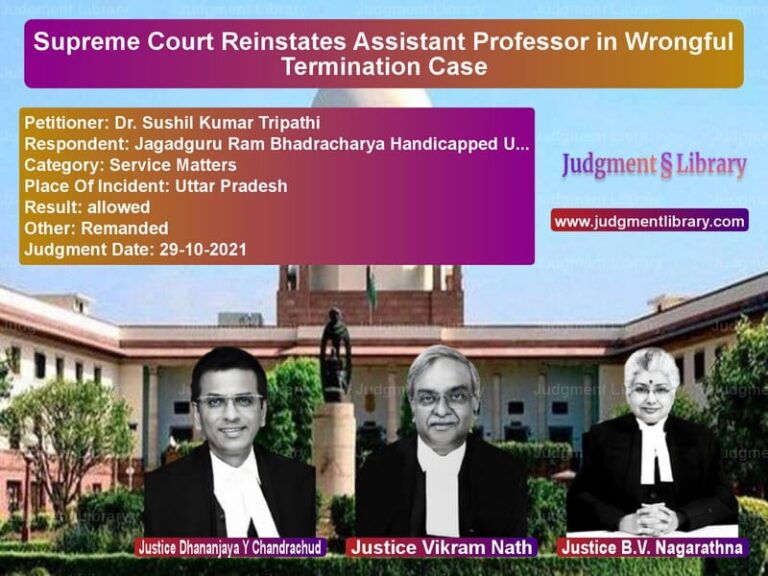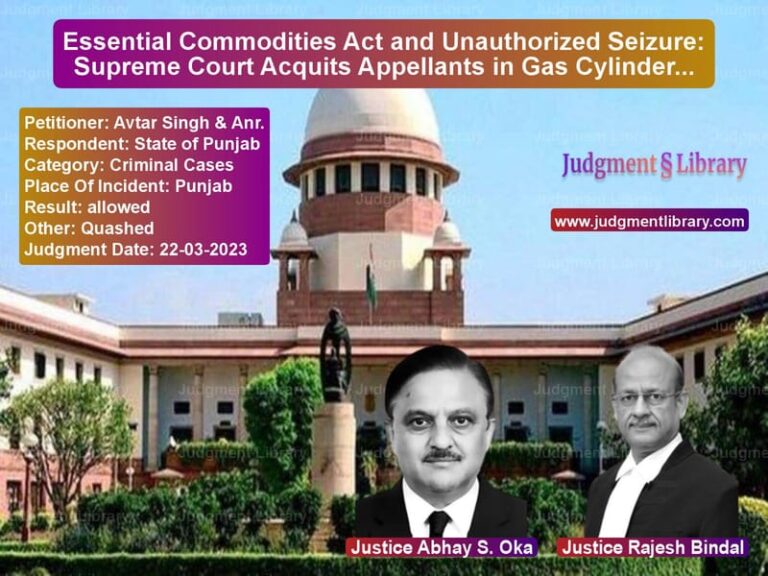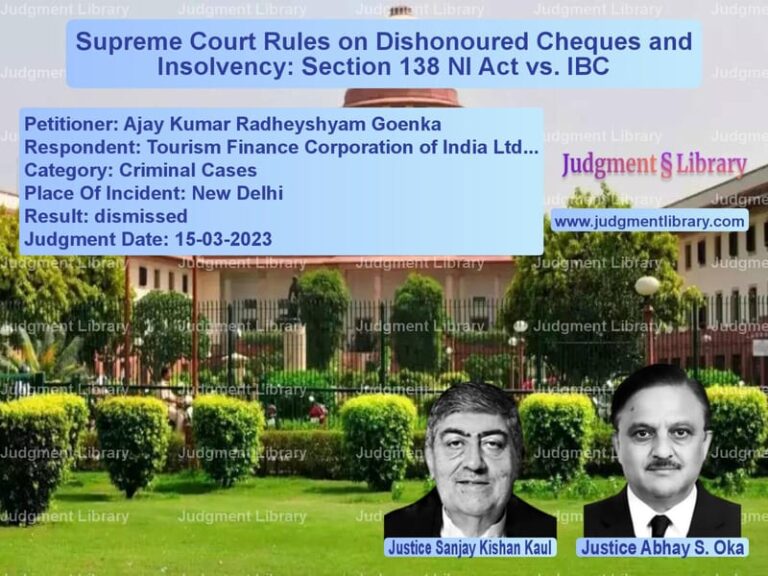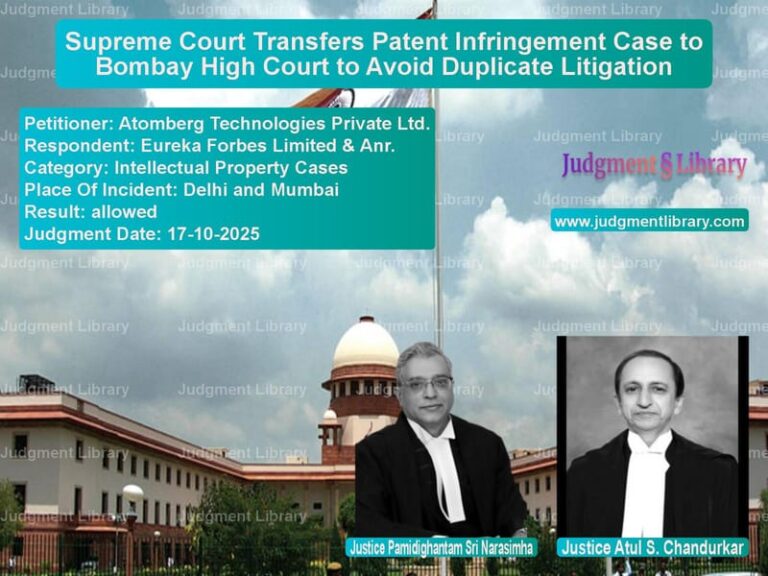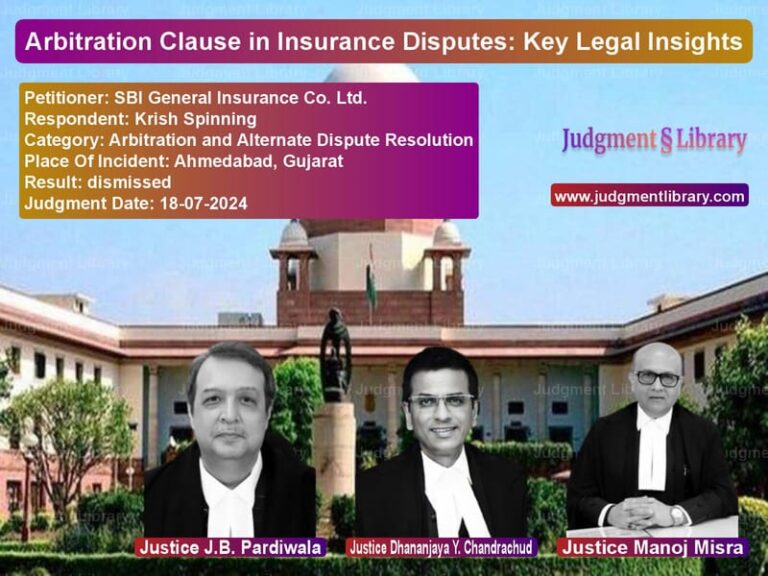Contempt Petition Against FCI: Regularization of Contract Workers in Food Corporation of India
The case of The Workmen through the Convener, FCI Labour Federation vs. Ravuthar Dawood Naseem is a significant legal battle concerning the rights of contract workers in the Food Corporation of India (FCI). This case revolves around the non-compliance of judicial directions issued for the regularization and departmentalization of contract laborers working in various FCI depots. The Supreme Court examined whether the FCI’s actions amounted to contempt of court and assessed the obligations of public sector undertakings in ensuring fair labor practices.
Background of the Case
The origins of this case can be traced to industrial disputes raised by workmen employed as contract laborers at different FCI depots across the Southern Zone of India. The disputes were initially filed before the Industrial Tribunal, Tamil Nadu, under Section 10(1)(d) of the Industrial Disputes Act, 1947. The workmen contended that they were engaged through contract labor cooperative societies or private contractors and had been working for 15-20 years, performing the same work as regular FCI employees.
The key issues before the Tribunal were:
- Whether the contract laborers engaged at FCI godowns through cooperative societies should be regularized.
- Whether workers in notified FCI depots should be given regular employment in light of government notifications prohibiting contract labor.
The Industrial Tribunal ruled in favor of the workmen, directing FCI to regularize and departmentalize them from the date of the notification banning contract labor. This decision was upheld by the Madras High Court, and later, the Supreme Court dismissed FCI’s appeal against the decision on August 20, 2018.
Petitioner’s Arguments
The petitioners (FCI laborers) argued that FCI had willfully disobeyed the Supreme Court’s ruling by failing to properly implement the regularization order. Their key points included:
- The Supreme Court’s ruling explicitly required regularization under the Departmental Labor System, but FCI placed workers under the Direct Payment System (DPS) instead, which offered inferior benefits.
- Regularization under DPS violated previous judicial precedents where contract workers were absorbed into the Departmental Labor System.
- FCI had regularized other contract workers under the Departmental Labor System in the past but was treating these workers unfairly.
- The delay in implementing the Supreme Court’s ruling caused financial hardship to the laborers, depriving them of full employment benefits.
Respondent’s Arguments
FCI contended that it had complied with the Supreme Court’s ruling by regularizing the workers under DPS. The key defense points were:
- The Tribunal’s ruling did not specify the exact system under which workers should be regularized.
- The Direct Payment System (DPS) had been in existence since 1973 and was a legitimate form of regular employment within FCI.
- Implementing the Departmental Labor System for all contract workers would cause a financial burden of Rs. 40,000 crores and a recurring liability of Rs. 3,000 crores annually.
- FCI had followed its policy in place since 1991, which stipulated that contract workers should only be regularized under DPS and not the Departmental Labor System.
Supreme Court’s Judgment
After hearing both parties, the Supreme Court ruled in favor of FCI and dismissed the contempt petitions. The Court found that:
- The Tribunal’s ruling only mandated regularization and departmentalization but did not specify that it had to be under the Departmental Labor System.
- FCI had legitimately regularized the workers under DPS, which provided substantial employment benefits, including job security until the age of 60, provident fund contributions, paid leave, and retirement benefits.
- There was no willful disobedience of the Court’s earlier ruling by FCI.
- Contempt of court requires a deliberate violation of a judicial order, which was not proven in this case.
Key Observations by the Supreme Court
The Supreme Court made several important observations while dismissing the contempt petitions:
- Nature of Departmentalization: The Court clarified that the term “departmentalization” does not necessarily mean regularization under the Departmental Labor System. Instead, it refers to bringing workers under an official employment structure within FCI.
- Legitimacy of DPS: The Court noted that DPS was an established system of regular employment and not an ad-hoc arrangement.
- Policy Considerations: The Court acknowledged that government organizations have the right to adopt labor policies, provided they do not violate existing labor laws.
- No Malafide Intent: Since FCI had followed its existing policies and there was no proof of deliberate defiance of judicial orders, contempt proceedings were not warranted.
Impact of the Judgment
The Supreme Court’s decision has significant implications for labor rights and judicial enforcement:
- It reaffirms that contempt petitions must establish a clear and willful disobedience of judicial orders.
- It clarifies that public sector employers have some discretion in implementing regularization orders, provided they adhere to labor laws.
- It underscores the importance of clarity in judicial orders regarding the specific terms of employment regularization.
- It sets a precedent for similar cases involving contract workers in government enterprises.
Conclusion
This case highlights the complexities of labor disputes in public sector enterprises and the challenges of enforcing court orders in large organizations like FCI. While the workers sought absorption into the Departmental Labor System, the Supreme Court upheld FCI’s decision to place them under DPS, ruling that it complied with the original order. The judgment emphasizes that contempt of court requires clear evidence of deliberate non-compliance, which was not present in this case.
Petitioner Name: The Workmen through the Convener, FCI Labour Federation.Respondent Name: Ravuthar Dawood Naseem.Judgment By: Justice A.M. Khanwilkar, Justice Dinesh Maheshwari.Place Of Incident: Southern Zone of India (Kerala, Andhra Pradesh, Karnataka, Tamil Nadu).Judgment Date: 19-05-2020.
Don’t miss out on the full details! Download the complete judgment in PDF format below and gain valuable insights instantly!
Download Judgment: The Workmen through vs Ravuthar Dawood Nase Supreme Court of India Judgment Dated 19-05-2020.pdf
Direct Downlaod Judgment: Direct downlaod this Judgment
See all petitions in Employment Disputes
See all petitions in Public Sector Employees
See all petitions in Termination Cases
See all petitions in Disciplinary Proceedings
See all petitions in Judgment by A M Khanwilkar
See all petitions in Judgment by Dinesh Maheshwari
See all petitions in dismissed
See all petitions in supreme court of India judgments May 2020
See all petitions in 2020 judgments
See all posts in Service Matters Category
See all allowed petitions in Service Matters Category
See all Dismissed petitions in Service Matters Category
See all partially allowed petitions in Service Matters Category

